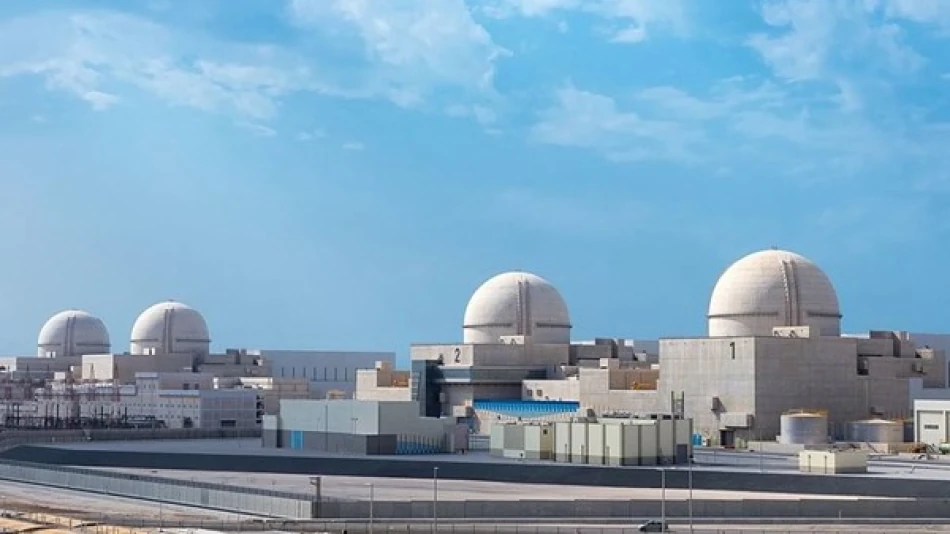
UAE's Peaceful Nuclear Program: Transparency Solidifies Global Leadership
UAE's Nuclear Transparency Sets New Global Standard as Barakah Plants Lead by Example
The United Arab Emirates has achieved something rare in the nuclear industry: earning "full transparency" certification from the International Atomic Energy Agency for three consecutive years. This recognition positions the UAE's peaceful nuclear program as a blueprint for emerging nuclear nations, demonstrating that newcomers to atomic energy can surpass established players in regulatory compliance and international cooperation.
A Decade of Strategic Nuclear Development
Since launching its peaceful nuclear program roughly a decade ago, the UAE has transformed from a nuclear novice into a reference model for countries seeking to integrate atomic energy into their power mix. The Barakah Nuclear Power Plants, operated by Emirates Nuclear Energy Corporation (ENEC), represent the culmination of careful planning that began with the UAE's 2008 policy document outlining its approach to peaceful nuclear development.
The 2008 policy framework established four core principles that have guided the program: complete transparency, adherence to the highest safety and security standards, nuclear non-proliferation commitment, and close cooperation with international bodies. These weren't merely aspirational goals—they were codified into law through the Nuclear Energy Law of 2009, creating binding legal obligations.
Unprecedented International Oversight
The UAE's approach to nuclear development stands out for its embrace of international scrutiny. The IAEA has conducted approximately 15 review and inspection missions at Barakah, while the World Association of Nuclear Operators has performed around 84 reviews and assessments. Additionally, the UAE's Federal Authority for Nuclear Regulation has carried out 496 comprehensive inspections and reviews of all operations and procedures.
This level of oversight far exceeds what many established nuclear nations accept, reflecting the UAE's strategy of building credibility through transparency rather than asserting sovereign rights to limit inspections.
Market Implications and Regional Impact
The UAE's success carries significant implications for the global nuclear industry. As countries like Saudi Arabia, Egypt, and others in the Middle East consider nuclear programs, the UAE model offers a proven pathway that satisfies international concerns while delivering energy security. This could accelerate nuclear adoption in the region, creating opportunities for reactor vendors and nuclear service companies.
Mohamed Al Hammadi, CEO of ENEC, emphasized that Barakah represents just the beginning, with the company exploring advanced reactor technologies and investment opportunities both domestically and internationally. This signals the UAE's intention to become not just a nuclear operator but a nuclear technology exporter.
Comparison with Global Nuclear Leaders
The UAE's transparency record contrasts sharply with some established nuclear powers that have faced IAEA criticism or compliance issues. Countries like Iran continue to face scrutiny over nuclear transparency, while even allies like South Korea have experienced regulatory challenges with their nuclear programs.
The UAE's approach mirrors Singapore's strategy in financial services—achieving rapid market leadership through regulatory excellence and international cooperation rather than relying on legacy advantages.
Long-term Strategic Vision
The UAE's nuclear journey began with its IAEA membership in 1976, but gained momentum through key agreements: the 1995 Nuclear Non-Proliferation Treaty signature, the 2003 Additional Protocol to the Comprehensive Safeguards Agreement, and various technical cooperation memoranda with the IAEA.
This methodical approach to international integration has created a foundation for the UAE to influence global nuclear governance. As climate pressures drive renewed interest in nuclear energy, the UAE's model of transparency-first development could become the standard for new nuclear nations, potentially reshaping how the international community approaches nuclear proliferation concerns while meeting clean energy goals.
The success of the UAE's nuclear program demonstrates that newcomers to the atomic age can set new standards for the industry, provided they prioritize international cooperation and transparency from the outset.
Most Viewed News

 Layla Al Mansoori
Layla Al Mansoori






